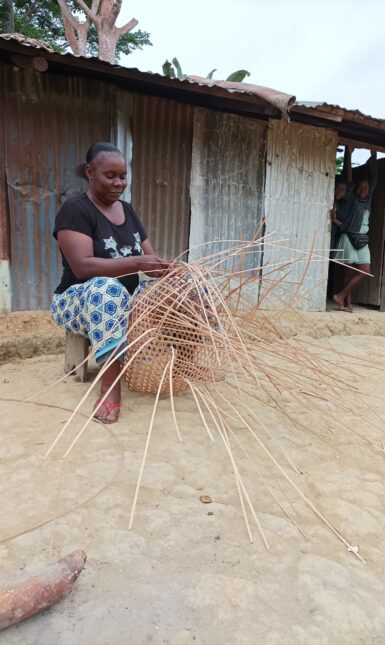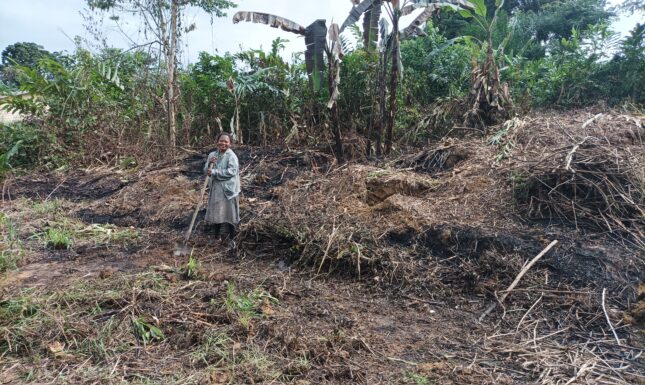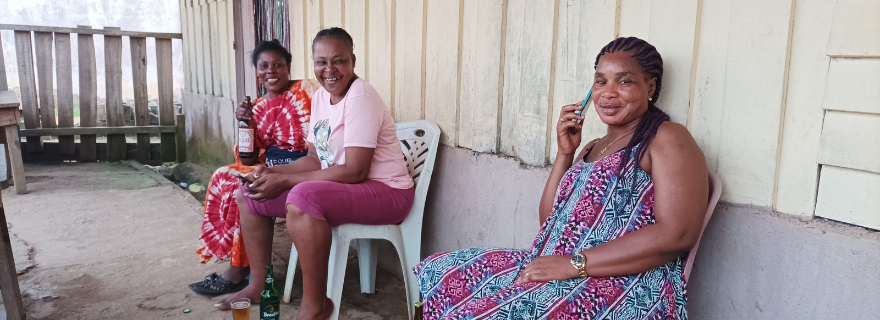"We are the ones who marry our husbands."
Paying attention to gender relations in north-eastern Gabon leads to an emphasis on ethnography's propensity to provide access to the ‘minor mode of reality’: what flaws, signs of change or everyday resistance reveal a different perspective on gender relations in the country?
It is a truism to say that contemporary Gabonese society is concerned with gender issues. Few years ago, Gladys Esseng Aba'a and Joseph Tonda highlighted "the prevailing machismo in Gabon". Regarding gender-related development policies, Judith Doutsona points to the gap between the country's international commitments and concrete achievements in terms of equality. In doing so, she acknowledges the importance of not relying solely on imported (European) normative frameworks to solve this issue. In my fieldwork, I aim to understand what frameworks are and how they can be employed to critically address gender relations in Gabon.
Who carries the baskets?
The literature (anthropological and beyond) on the ethnolinguistic groups of Central Africa largely emphasises the gendered distribution of daily village activities. I observed this, for example, when I visited the village of Mananga on the Ivindo River to see one of the four interns I supervised between mid-July and mid-August 2024: Dorian Axel Mondo Me Mbane. The morning before I left, a woman was sitting in front of her house, weaving a basket used for fishing. Made of vines, the basket is called "the condemned" because fish are stored until the end of a fishing trip. The relationship between the shape of this object and the gender of the person is interesting to note: in this case, it is a weaving activity aimed at creating an object for storage and carrying. The fact that a woman is performing this action makes it congruent with the "morphological approach to the sexual division of labour". Proposed by Klaus Hamberger and Francesca Fanciulli, this notion establishes a link between the penetrative or encompassing nature of technical objects and the production of gender of manufacturers or users.

I am particularly familiar with this situation in the village of Pont de la Zadié, where I conducted much of my thesis research in the early 2010s and to where I returned in 2024. In agricultural work, while men may provide some assistance during the clearing phases (especially when it comes to operating mechanical equipment such as chainsaws) and burning plots, women go to the fields regularly – maintaining the soil, planting the cuttings, tending to the crops and bringing back cassava, taro and yam tubers, as well as any available vegetables and firewood. What the expression "Africa of baskets" does not say, therefore, is who carries the baskets. While women go to their plantations in the morning, the gendered division of labour (which is constantly reinforced and repeated through the use of techniques and associated objects) does not stop there, as they have to take care of a large part of the household chores, starting with cooking and childcare.
The name of the game
It is possible to differentiate between the actual forms of male domination in certain aspects of village organisation, particularly with regard to economic issues, and control over money (in the material sense of the term). In the village of Mananga, for example, the bar was run by a couple; the wife did the accounts and kept control of the cash. Similarly, when the couple returned to Makokou to sell fish and game, she negotiated the prices and collected the money. In the village of Zadié too, and in fact in several villages I passed through without stopping for long, the main bar is run by women. This does not necessarily mean that these women are free to use the money they collect as they wish, especially since these activities may be modest in scale and the choices related to profit margins are heavily constrained by daily necessities. However, such roles reflect a confidence that has been earned, which is not insignificant in a rural context where money is scarce and sought after, including in the sense of handling and retaining coins and banknotes.
Low-key communication
In the context of everyday household life, it is also clear that relationships are often less strictly hierarchical than they may appear at first glance. This was the case in the house where I lived in the village of Pont de la Zadié. Mathieu Loembet, whom I had met about ten years earlier, now lives with a new wife. The division of tasks between them is consistent with what has been described above, except that he oversees the bar (which is not very successful). He is all the more in control of the premises because his new partner, Marlène Essola, is not from this village. Nevertheless, in their daily interactions, through subtle intonations or remarks, when he asks too much or tries to exert inappropriate authority, I have noticed that she knows how to put him in his place and point out his excesses, using phrases that are as brief as they are meaningful. For instance: uttering an onomatopoeia followed by his surname with a certain intonation. This does not call into question the obvious disproportion in their respective workloads or local prominence, but it is as if Marlène is following a "script" that she accepts and whose limits she knows how to remind Mathieu of when necessary (with the possibility that she too could leave and return to her own family).

Shift in script?
Finally, on the evening before my departure from Makokou at the end of September 2024, I had an open conversation with a fifty-year-old woman. We discussed the relationship between women and men in the country. She told me how, in her opinion, appearances are deceiving in this regard. Men certainly occupy the most visible positions, have easier access to salaried jobs (companies in the region employ very few women outside of secretarial or domestic roles) and to cash. However, they squander their money, spend their time trying to sleep with young women – in the context of expensive economic-sexual relationships – and drink too much and too often... As a result, it is not only through the sale of drinks or products from hunting or fishing that women regularly control household finances. This is why a woman may pay for her husband's suit when they must attend a ceremony. These gender dynamics are not widely known, because it can be a source of shame for the men to whom this applies. My interlocutor summed up the situation with the following statement: "We are the ones who marry our husbands". This reflects the shift that is taking place. By paying ethnographic attention to gender relations, I attempted to highlight the intersection of two lines of analysis: the first, and most important, shows that the gender division of labour is quite pronounced in the Makokou region. This division takes on meaning and consistency through its regular reiteration in the concrete actions carried out by women and men. The second, minor line of analysis, reveals gender relations that prove to be more complex and ambivalent, implicitly indicating in turn how much the major line is the result of social work that is both institutionalised and performed.



0 Comments
Add a comment